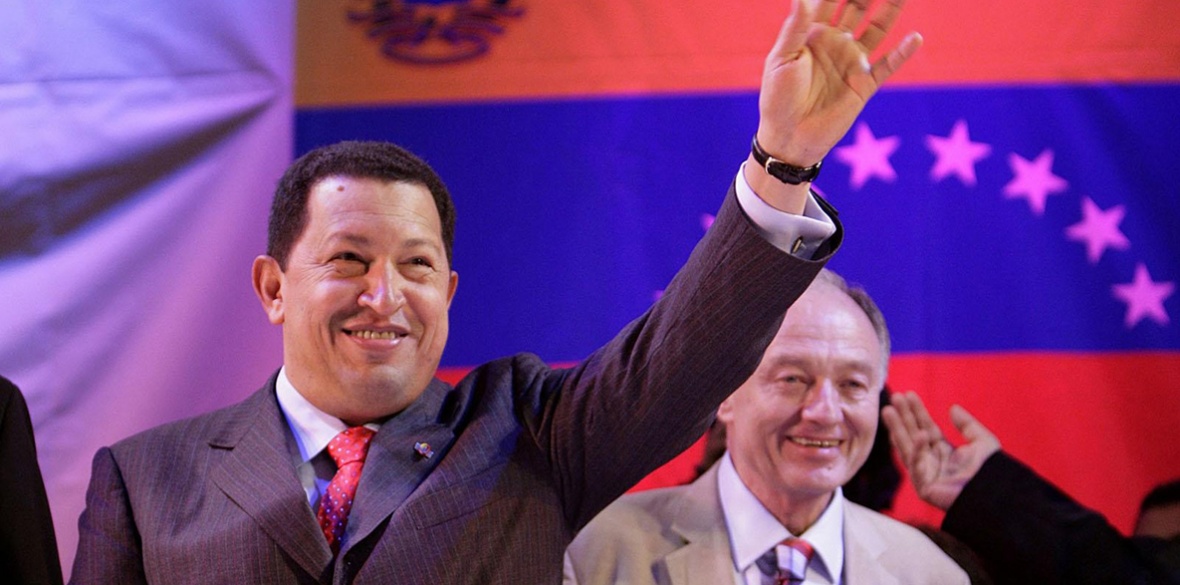This is the last article you can read this month
You can read more article this month
You can read more articles this month
Sorry your limit is up for this month
Reset on:
Please help support the Morning Star by subscribing here
NINETEEN years ago in Venezuela a right-wing military coup briefly unseated its elected President Hugo Chavez before loyal armed forces units and a popular mobilisation of Caracas’s barrios turned the tables and restored Chavez to the presidency.
The coup was mounted by a combination of industrialists, businessmen, media owners, the principal trade union movement’s leaders, Catholic bishops and conservative military officers, working closely with the US government.
When Chavez won the presidential election in 1998 with 57 per cent of the vote and a mission to transform the country, Venezuela was not — contrary to a mainstream media myth — a model, egalitarian social democracy.
Forty years of a rigged two-party system had kept wealth distribution in the country grossly unequal: up to seven in 10 people lived in poverty.
Venezuela’s massive oil wealth, with the largest reserves in the world, enriched a tiny elite at home and multinationals abroad.
Chavez’s programme to reform and democratise the country and use its oil resources to deliver wide-ranging social and economic improvements had alarmed both the country’s powerful elites and the US, with its eye on what was happening in its “backyard.”
In 2001 Chavez had proposed 49 radical new laws, including measures on the production and taxation of oil, increasing government oil royalties and setting a 51 per cent stake in all joint ventures with foreign companies — thus effectively ending oil executives’ hopes of privatisation for the state oil company PdVSA and jeopardising their control and siphoned-off profits.
As the threatened elites inside Venezuela began to envisage ousting Chavez, the US poured hundreds of thousands of dollars into strengthening the opposition and planning for a coup.
A group of Venezuelan military officers (trained at the School of the Americas, a US army facility dubbed “a school for dictators, torturers and assassins”) linked with their US equivalents to firm up arrangements.
The US’s complicity in the coup is clearly acknowledged in a subsequent US State Department document: “…it is clear that NED [the National Endowment for Democracy], Department of Defense (DOD), and other US assistance programs provided training, institution building, and other support to individuals and organizations understood to be actively involved in the brief ouster of the Chavez government.”
The 2002 coup in Venezuela is by no means an isolated example of US interference coming to the aid of anti-democratic, right-wing elites desperate to defend their power and privileges against democratic reforms.
As Richard Gott has clearly explained in his excellent pamphlet, The US War on Democracy in Latin America, United States intervention in Latin America has taken “many forms … appearing in different disguises… [S]ometimes diplomatic persuasion … sometimes economic pressure … and on occasion military invasion.”
The objective of all these methods is to bring freely elected democratic governments to heel and ensure that any radical ambitions are curtailed.
Time and again popular reforming governments have run hard up against the US’s pursuit of the Monroe Doctrine and have fallen foul of subversive, anti-democratic right-wing forces aided by the United States, often with draconian results.
An early example from the latter part of the 20th century is the overthrow in 1954 of the progressive government of Jacobo Arbenz in Guatemala by a force of dissident army officers funded and trained by the CIA, resulting in 12,000 arrests and exile for 2,000 activists.
The reversal of Arbenz’s land reforms unleashed a long-lasting war in the countryside killing more than 200,000 mostly indigenous people and a succession of military or military-controlled governments.
Perhaps the most infamous example of a US-backed coup is the military overthrow of president Salvador Allende’s Popular Unity government in Chile, which was succeeded by the brutal dictatorship of General Augusto Pinochet.
Although carried out in September 1973, the coup had been three years in the making, ever since president Richard Nixon had ordered the CIA to “make the economy scream.”
Pinochet’s murderous rule was characterised by torture, deaths and disappearances but also by the adoption of neoliberal economic policies espoused by Milton Friedman.
These effectively dismantled Chile’s public sector, abolished financial and trade regulations and made unemployment soar tenfold, inflicting huge social costs on most of the population.
Fast forward 35 years — past Reagan’s “contra war” against the Nicaraguan revolution, the US invasions of Grenada and Panama and US ongoing support for a number of Latin American dictatorships — to another example of a progressive government brought down by a military coup: the ousting of Honduras’s democratically elected president Manuel Zelaya in 2009.
Although the coup was condemned internationally, president Barack Obama refused to recognise it as such.
Several US officials — notably then-secretary of state Hillary Clinton — played an important role in preventing Zelaya’s return to office, enabling the junta to consolidate its hold on power despite massive non-violent protests.
Since then, the anti-democratic right’s machinations have continued apace across Latin America — in Paraguay for example, Brazil, Ecuador and Venezuela. Most recently in Bolivia, a military coup deposed president Evo Morales on alleged grounds of electoral fraud that proved to be baseless.
Their common features include the claim of rigged elections when defeated at the polls; embracing generous US funding to develop a strategy and media voice to confront the government; the use of “lawfare” to politically persecute left parties and decapitate their leadership; a willingness to resort to street violence, sabotage and other means of destabilisation; a readiness to use the military to effect “regime change”; and propagating narratives to legitimise these strategies.
Solidarity activists need to be on constant alert to these threats and to ensure these narratives and strategies do not go unchallenged.
Follow Ken at www.twitter.com/Ken4London and www.facebook.com/KenLivingstoneOfficial
Join the Venezuela Solidarity Campaign at www.venezuelasolidarity.co.uk/join.












